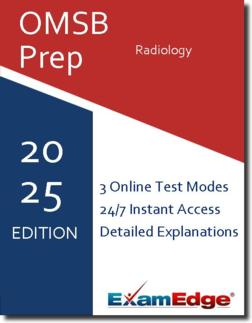OMSB Radiology ( Radiology ) Practice Tests & Test Prep by Exam Edge - FAQ
Based on 34 Reviews
- Real Exam Simulation: Timed questions and matching content build comfort for your OMSB Radiology test day.
- Instant, 24/7 Access: Web-based Oman Medical Specialty Board Radiology practice exams with no software needed.
- Clear Explanations: Step-by-step answers and explanations for your OMSB exam to strengthen understanding.
- Boosted Confidence: Reduces anxiety and improves test-taking skills to ace your Oman Medical Specialty Board Radiology ( Radiology ).

Why should I use Exam Edge to prepare for the Oman Medical Specialty Board Radiology Exam?
FAQ's for Exam Edge Oman Medical Specialty Board Radiology practice tests
- Comprehensive content: Exam Edge's Oman Medical Specialty Board Radiology practice tests are created specifically to prepare you for the real exam. All our OMSB Radiology practice test questions parallel the topics covered on the real test. The topics themselves are covered in the same proportions as the real test too, based on outlines provided by the Oman Medical Specialty Board in their OMSB Radiology test guidelines.
- Realistic practice: Our OMSB Radiology practice exams are designed to help familiarize you with the real test. With the same time limits as the real exam, Our OMSB practice tests enable you to practice your pacing and time management ahead of test day.
- Detailed explanations: As you complete your practice tests, we show you which questions you answered correctly and which ones you answered incorrectly, in addition to providing you with detailed step-by-step explanations for every single Oman Medical Specialty Board Radiology practice exam question.
- Performance insights: After you complete a practice test, we provide you with your raw score (how many you answered correctly) and our estimate of the OMSB Radiology score you would have received if you had taken the real test.
- Ease of access: Because all Our OMSB practice tests are web-based, there is no software to install. You can take OMSB Radiology practice exams on any device with access to the internet, at any time.
- Flexible use: If you must pause while taking one of Our OMSB practice exam, you can continue right where you left off. When you continue the test, you will start exactly where you were, and with the same amount of time you had remaining.
- Thousands of unique questions: We offer 10 different online practice exams with 1,000 unique questions to help you prepare for your Oman Medical Specialty Board Radiology !
- Low cost: The cost of ordering 5 practice tests is less than the cost of taking the real OMSB Radiology test. In other words, it would be less expensive to order 5 practice tests than to retake the real Oman Medical Specialty Board Radiology exam!
- Our trusted reputation: As a fully accredited member of the Better Business Bureau, we uphold the highest level of business standards. You can rest assured that we maintain all of the BBB Standards for Trust.
- Additional support: If you need additional help, we offer specialized tutoring. Our tutors are trained to help prepare you for success on the Oman Medical Specialty Board Radiology exam.
What score do I need to pass the OMSB Radiology Exam?
To pass the Oman Medical Specialty Board Radiology test you need a score of 72.
The range of possible scores is 0 to 100.
How do I know the practice tests are reflective of the actual Oman Medical Specialty Board Radiology ?
At Exam Edge, we are proud to invest time and effort to make sure that Our OMSB practice tests are as realistic as possible. Our practice tests help you prepare by replicating key qualities of the real test, including:
- The topics covered
- The level of difficulty
- The maximum time-limit
- The look and feel of navigating the exam
Do you offer practice tests for other Oman Medical Specialty Board subjects?
Yes! We offer practice tests for 10 different exam subjects, and there are 180 unique exams utilizing 18000 practice exam questions. Every subject has a free sample practice test you can try too!
Oman Medical Specialty Board Dental Hygiene ( Dental Hygiene)
Practice Tests
Oman Medical Specialty Board Dentistry ( Dentistry)
Practice Tests
OMSB Dietitian / Nutrition ( Dietitian / Nutrition )
Practice Tests
OMSB Medical Laboratory (Lab Technicians) ( Medical Laboratory (Lab Technicians))
Practice Tests
Oman Medical Specialty Board Midwifery ( Midwifery )
Practice Tests
Oman Medical Specialty Board Nursing ( Nursing )
Practice Tests
Oman Medical Specialty Board Occupational Therapy (OT)
Practice Tests
Oman Medical Specialty Board Physiotherapy ( Physiotherapy )
Practice Tests
Oman Medical Specialty Board Radiology ( Radiology )
Practice Tests
OMSB Sonography - Ultrasound ( Sonography - Ultrasound)
Practice Tests
To order tests, or take a sample test, for a different subject:
Click on ' Name on the Exam Name' You will be take to the orders page
How do I register for the real Oman Medical Specialty Board?
For up-to-date information about registration for the Oman Medical Specialty Board, refer to the Oman Medical Specialty Board website.


